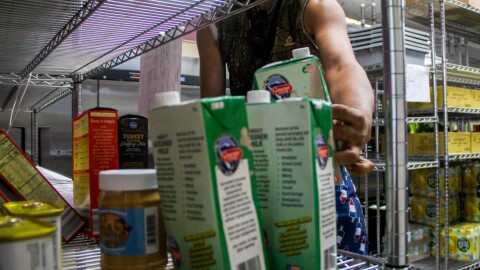Franklin County expects more than 4,000 refugees and legal immigrants will lose SNAP benefits, also known as food stamps, because of federal cuts to the food and nutrition assistance program.
President Donald Trump's administration will now limit SNAP eligibility to mostly U.S. citizens and green card holders who have completed a five-year waiting period, with limited exceptions for some Haitian and Cuban refugees. That means coverage ends for most other legal immigrants starting in November.
The county called attention to the families impacted at an event Tuesday with a group of the immigrants impacted and some of the community organizations that aid them on Thursday. Those impacted include asylum seekers, refugees, parolees, survivors of domestic violence and human trafficking victims.
This change was made under Trump's reconciliation domestic policy bill known as the "Big Beautiful Bill," which passed this year.
The bill passed with the support of all but one Ohio Republican, U.S. Rep. Warren Davidson, in Congress. U.S. Senators Bernie Moreno and Jon Husted alongside central Ohio Republican Reps. Mike Carey, Dave Joyce, Troy Balderson and Jim Jordan supported the legislation.
No Democrat in Congress supported the bill.
Franklin County Deputy Administrator Joy Bivens said more than 1,000 of these refugees are children and about 400 are Afghan and Iraqi refugees who aided the U.S. during the Middle East conflicts of the past decades.
Bivens said more than 183,000 people in Franklin County receive SNAP benefits, the majority of which are children and seniors.
"SNAP is the nation's largest anti-hunger program providing vital food assistance to nearly 42 million American households," Bivens said. "It also was one of the most successful anti-poverty programs... helping move or keep millions of families above the poverty line each year."
Bivens said many of the people affected were given notice by the Ohio government about the benefits cut.

Franklin County Board of Commissioners Chair Erica Crawley stressed the importance of SNAP to these families.
"They are people who have endured trauma, made tremendous sacrifices and risked their lives to give their families security and freedom. For many, government programs like SNAP are a lifeline," Crawley said.
Crawley said more of the cost burden responsibility for caring for those in need is being shifted to local government agencies like Franklin County Job and Family Services and community partners. She said the county is not prepared to shoulder all of this burden.
"We are not prepared enough where we have unlimited resources. We do not, financially we don't have unlimited resources. They're finite. And we have a number of different programs and initiatives that we are supporting," Crawley said.
Crawley defended these immigrants at a time when she says the groups are being subjected to misinformation and stereotypes. She explained how these legal immigrants are allowed to enter the country and they undergo extensive background checks and security screenings. Eventually, they are given permission to work and some limited access to government support as they begin a new life in America.
"Now, the proposed changes to SNAP benefits will put many of these families in jeopardy," Crawley said.
Commissioner John O'Grady said immigrants make up just 8.7% of Ohio's population, but they contribute nearly 12% of our region's GDP and generate $2.1 billion of central Ohio's annual tax revenue.
"They are not a burden. They are part of Franklin County's backbone," O'Grady said.
O'Grady said the county has other benefit programs and community partners can also help these immigrants as they lose SNAP benefits. He said helping and lifting up immigrants will benefit the whole community.
"We have to take care of everybody, that's the basis of economic development. You can't have just some people doing well, you can't just have the wealthiest people getting very, very rich and then other people at the very other end of the spectrum not doing well," O'Grady said.

Jewish Family Services CEO Karen Mozenter was one of the county's community partners who spoke at the press conference. She brought up several immigrants from Afghanistan, the Democratic Republican of the Congo, Ukraine, Eritrea and Sudan.
Mozenter said the SNAP benefits cuts will effect more than just these immigrants.
"These are our neighbors. They have done everything right. And they are eager to contribute as Americans. Cutting off the support that helps them feed their families and care for them while they find their footing in a new country, that hurts them, and that hurts all of us," Mozenter said.
Bivens said that if someone receives a letter stating their benefits are being cut and they believe that the government has their citizenship status wrong, she urges people to visit or contact a local Franklin County Department of Job and Filming Services as soon as possible.
Bivens said people can visit any of the county's three opportunity centers located around the county or the One Door program at the county's downtown offices. At these locations or at JFS, people can update their citizenship papers.
Bivens said the county can also assist these immigrants to find other forms of assistance.




